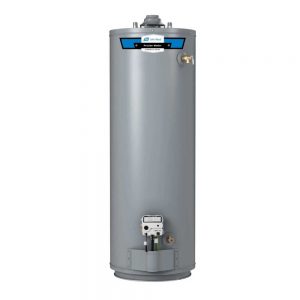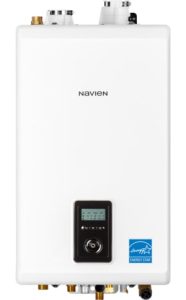You might not know some of the differences between installing a hot water tank and a combi boiler system. Both boilers and water heaters are used to supply hot water to a home or building, but it’s used for different reasons.
Understanding the difference between these two appliances that provide heat and hot water is important for all homeowners to know if they’re looking to get the most out of their heating system.
 What is a Water Heater?
What is a Water Heater?
Just as the name implies, a hot water heater is used to heat water. Hot water heaters provide potable water, which means you can use this hot water to shower, wash, cook, and clean.
A traditional tank model water heater will store the hot water in a large tank, and pump it throughout the home when you open a tap or start an appliance that uses hot water.
Tankless water heaters don’t store any hot water, but instead rapidly heat cold water on-demand. This type of water heater takes up far less space than traditional tank water heaters, but won’t be able to provide a supply of potable water in an emergency situation where your water supply is shut off.
Want more information? Read our extensive guide to buying a hot water heater.
What is a Boiler?
 Boilers heat water, but not for you to use from taps to bathe and cook with. Instead, it heats water (some models turn it into steam), distributing it around the house through infloor tubing or radiators in order to heat it up. This is what’s known as a radiant heat system.
Boilers heat water, but not for you to use from taps to bathe and cook with. Instead, it heats water (some models turn it into steam), distributing it around the house through infloor tubing or radiators in order to heat it up. This is what’s known as a radiant heat system.
Just as with a hot water heater, a boiler will take cold water, heat it up, then use a pump to push the hot water or steam throughout a network of pipes to radiators located throughout the home. This home heating system produces quiet, even heat, and might be a good option if you suffer from allergies or dry air—furnaces heat and blow air, which can dry out your home’s indoor air and distribute allergens.
How Does a Combi-Boiler Work?
What about a combi boiler? A combination boiler (or combi-boiler) is an all-in-one furnace and a tankless hot water heater. It is a single unit that eliminates the need for a water storage tank, and can offer more than 90% efficiency (some units can be as efficient as 95-98%).
A combi-boiler uses steam, hot water, or baseboard radiators to distribute heat throughout your home. And when you turn on a tap, the same water that’s already heated is available to use for washing or cooking. The combination boiler has a built-in heat exchanger that automatically burns natural gas and transfers the resulting heat to the cold water. Once that cold water is heated up to the correct temperature, it’s transferred to the hot water tap you’ve turned on.
While it is typically more expensive than tankless water heaters, it might be a good option to look into if you’re undergoing renovations, since you won’t need to swap out an entire furnace or HVAC system.
What’s the Difference?
Both boilers and water heaters have some of the same functions of heating water for home use, but those uses are different.
Essentially, a boiler system is used to provide heat to your home using radiant heat. A hot water heater will provide domestic hot water (water that you can use to drink, bathe, or wash with).
Efficiency
There are several fuel sources for boilers, such as natural gas, propane, or heating oil. Hot water heaters can rely on electricity, natural gas, propane, or even solar power.
It’s hard to directly compare the two heating systems, especially since each will have many models and types that vary in their efficiency.
With either a boiler and a water heater, you’ll need another system that offers what the other doesn’t. Unless, of course, you go with a combi-boiler, which can heat your home and provide hot water in a single unit.
Capacity
Both tank and tankless heaters will need to be sized to properly deliver how much hot water you need, at the proper temperature, albeit using different measurements. Tankless water heaters use Gallons per Minute (GPM) to measure the maximum temperature rise possible at a given flow rate, whereas tank heaters use the volume of the storage tank.
A tank that’s too small will not be able to deliver the amount of hot water your household needs, but if you get a tank water heater that’s too large, you’ll end up paying to heat water that you’ll never get to use.
A boiler heats in much the same way, and so you should consider your household size when choosing a boiler. Modern technology means that these appliances are more efficient than ever, and so homeowners no longer need to “size up” in order to compensate for potential heat loss. An oversized boiler will only result in paying more than you need for your gas bill.
Life Expectancy
Boilers have a lifespan of 15-20 years, when properly maintained. water heaters offer life spans of about 10 to 12 years. As with any appliance, keeping it properly maintained with professional servicing will extend the life expectancy of your unit.
If life expectancy is your top concern, it’s worth looking into a tankless water heater. These types of water heaters can last up to 20 years if properly maintained.
Maintenance
As with any major appliance, both a boiler and a water heater will require maintenance to keep it in good working condition.
For boilers, annual inspection is highly recommended to, regularly clean out any vents and flues, fully flush and clean the system, descale lime buildup, and lubricate any moving parts about twice a year.
Annual inspections are recommended for water heaters as well to check for any leaks or other issues. You’ll also have to test the water valve (with the power off) to make sure it stops the flow correctly, and drain the tank to get rid of any sediment inside.
Cost
Typically, a boiler installation is a more significant investment than a water heater installation. When you add up the cost of the unit itself and the cost of installation labour, a boiler can be somewhere between $8,500- $10,500.
For water heaters, the total cost of purchase and installation might set you back somewhere between $2,000- $4,000. Tankless water heaters (in comparison to tank water heaters) can cost more than this, so be sure to do your research before deciding and comparing between a boiler and a water heater.
Get the Best Option for Your Home with Hot Water Ottawa
Whether you’re looking for professional advice, or have already decided on an IBC combi boiler or a tankless water heater, Hot Water Ottawa can help. Book online for a free quote on our installation services, and we’ll help you choose the make and model that suits your home and budget.
